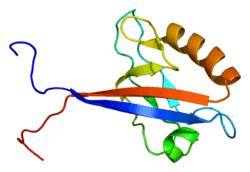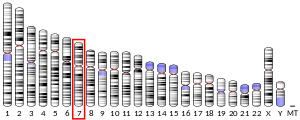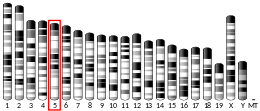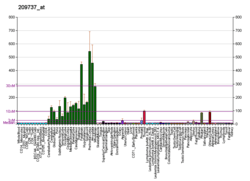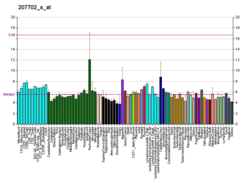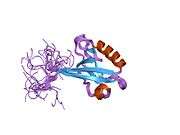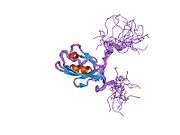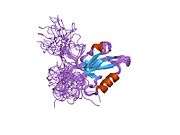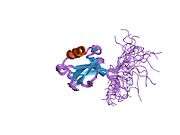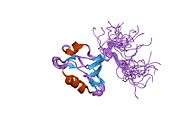MAGI2
Membrane-associated guanylate kinase, WW and PDZ domain-containing protein 2 also known as membrane-associated guanylate kinase inverted 2 (MAGI-2) and atrophin-1-interacting protein 1 (AIP-1) is an enzyme that in humans is encoded by the MAGI2 gene.[5][6][7]
Function
The protein encoded by this gene interacts with atrophin-1. Atrophin-1 contains a polyglutamine repeat, expansion of which is responsible for dentatorubral-pallidoluysian atrophy. This encoded protein is characterized by two WW domains, a guanylate kinase-like domain, and multiple PDZ domains. It has structural similarity to the membrane-associated guanylate kinase homologue (MAGUK) family.[7]
Interactions
MAGI2 has been shown to interact with ATN1[8] and PTEN (gene).
gollark: Oh, right, the Turing completeness thing is a weird joke.
gollark: Really? They're complaining about the strings being made saner now?
gollark: <@237328509234708481> Python 3 isn't Turing-complete?!
gollark: If anyone disagrees they will be branded a physicist and disposed of. As everyone knows, physicists and chemists are mortal enemies.
gollark: Of course, if you can somehow convert the Os to 0s, they look pretty similar already, then PROBLEM SOLVED!
References
- GRCh38: Ensembl release 89: ENSG00000187391 - Ensembl, May 2017
- GRCm38: Ensembl release 89: ENSMUSG00000040003 - Ensembl, May 2017
- "Human PubMed Reference:". National Center for Biotechnology Information, U.S. National Library of Medicine.
- "Mouse PubMed Reference:". National Center for Biotechnology Information, U.S. National Library of Medicine.
- Shoji H, Tsuchida K, Kishi H, Yamakawa N, Matsuzaki T, Liu Z, Nakamura T, Sugino H (Mar 2000). "Identification and characterization of a PDZ protein that interacts with activin type II receptors". J Biol Chem. 275 (8): 5485–92. doi:10.1074/jbc.275.8.5485. PMID 10681527.
- Ishikawa K, Nagase T, Suyama M, Miyajima N, Tanaka A, Kotani H, Nomura N, Ohara O (Dec 1998). "Prediction of the coding sequences of unidentified human genes. X. The complete sequences of 100 new cDNA clones from brain which can code for large proteins in vitro". DNA Res. 5 (3): 169–76. doi:10.1093/dnares/5.3.169. PMID 9734811.
- "Entrez Gene: MAGI2 membrane associated guanylate kinase, WW and PDZ domain containing 2".
- Wood, J D; Yuan J; Margolis R L; Colomer V; Duan K; Kushi J; Kaminsky Z; Kleiderlein J J; Sharp A H; Ross C A (Jun 1998). "Atrophin-1, the DRPLA gene product, interacts with two families of WW domain-containing proteins". Mol. Cell. Neurosci. United States. 11 (3): 149–60. doi:10.1006/mcne.1998.0677. ISSN 1044-7431. PMID 9647693.
Further reading
- Wood JD, Yuan J, Margolis RL, et al. (1998). "Atrophin-1, the DRPLA gene product, interacts with two families of WW domain-containing proteins". Mol. Cell. Neurosci. 11 (3): 149–60. doi:10.1006/mcne.1998.0677. PMID 9647693.
- Sanger Centre, The; Washington University Genome Sequencing Cente, The (1999). "Toward a complete human genome sequence". Genome Res. 8 (11): 1097–108. doi:10.1101/gr.8.11.1097. PMID 9847074.
- Ide N, Hata Y, Deguchi M, et al. (1999). "Interaction of S-SCAM with neural plakophilin-related Armadillo-repeat protein/delta-catenin". Biochem. Biophys. Res. Commun. 256 (3): 456–61. doi:10.1006/bbrc.1999.0364. PMID 10080919.
- Wu X, Hepner K, Castelino-Prabhu S, et al. (2000). "Evidence for regulation of the PTEN tumor suppressor by a membrane-localized multi-PDZ domain containing scaffold protein MAGI-2". Proc. Natl. Acad. Sci. U.S.A. 97 (8): 4233–8. Bibcode:2000PNAS...97.4233W. doi:10.1073/pnas.97.8.4233. PMC 18208. PMID 10760291.
- Xu J, Paquet M, Lau AG, et al. (2001). "beta 1-adrenergic receptor association with the synaptic scaffolding protein membrane-associated guanylate kinase inverted-2 (MAGI-2). Differential regulation of receptor internalization by MAGI-2 and PSD-95". J. Biol. Chem. 276 (44): 41310–7. doi:10.1074/jbc.M107480200. PMID 11526121.
- Vazquez F, Grossman SR, Takahashi Y, et al. (2002). "Phosphorylation of the PTEN tail acts as an inhibitory switch by preventing its recruitment into a protein complex". J. Biol. Chem. 276 (52): 48627–30. doi:10.1074/jbc.C100556200. PMID 11707428.
- Nishimura W, Yao I, Iida J, et al. (2002). "Interaction of synaptic scaffolding molecule and Beta -catenin". J. Neurosci. 22 (3): 757–65. doi:10.1523/JNEUROSCI.22-03-00757.2002. PMC 6758496. PMID 11826105.
- Nakayama M, Kikuno R, Ohara O (2003). "Protein-protein interactions between large proteins: two-hybrid screening using a functionally classified library composed of long cDNAs". Genome Res. 12 (11): 1773–84. doi:10.1101/gr.406902. PMC 187542. PMID 12421765.
- Strausberg RL, Feingold EA, Grouse LH, et al. (2003). "Generation and initial analysis of more than 15,000 full-length human and mouse cDNA sequences". Proc. Natl. Acad. Sci. U.S.A. 99 (26): 16899–903. Bibcode:2002PNAS...9916899M. doi:10.1073/pnas.242603899. PMC 139241. PMID 12477932.
- Yap CC, Muto Y, Kishida H, et al. (2003). "PKC regulates the delta2 glutamate receptor interaction with S-SCAM/MAGI-2 protein". Biochem. Biophys. Res. Commun. 301 (4): 1122–8. doi:10.1016/S0006-291X(03)00070-6. PMID 12589829.
- Scherer SW, Cheung J, MacDonald JR, et al. (2003). "Human chromosome 7: DNA sequence and biology". Science. 300 (5620): 767–72. Bibcode:2003Sci...300..767S. doi:10.1126/science.1083423. PMC 2882961. PMID 12690205.
- Hillier LW, Fulton RS, Fulton LA, et al. (2003). "The DNA sequence of human chromosome 7". Nature. 424 (6945): 157–64. Bibcode:2003Natur.424..157H. doi:10.1038/nature01782. PMID 12853948.
- Evgrafov OV, Mersiyanova I, Irobi J, et al. (2004). "Mutant small heat-shock protein 27 causes axonal Charcot-Marie-Tooth disease and distal hereditary motor neuropathy". Nat. Genet. 36 (6): 602–6. doi:10.1038/ng1354. PMID 15122254.
- Franklin JL, Yoshiura K, Dempsey PJ, et al. (2005). "Identification of MAGI-3 as a transforming growth factor-alpha tail binding protein". Exp. Cell Res. 303 (2): 457–70. doi:10.1016/j.yexcr.2004.10.007. PMID 15652357.
- Hu Y, Li Z, Guo L, et al. (2007). "MAGI-2 Inhibits cell migration and proliferation via PTEN in human hepatocarcinoma cells". Arch. Biochem. Biophys. 467 (1): 1–9. doi:10.1016/j.abb.2007.07.027. PMID 17880912.
This article is issued from Wikipedia. The text is licensed under Creative Commons - Attribution - Sharealike. Additional terms may apply for the media files.
